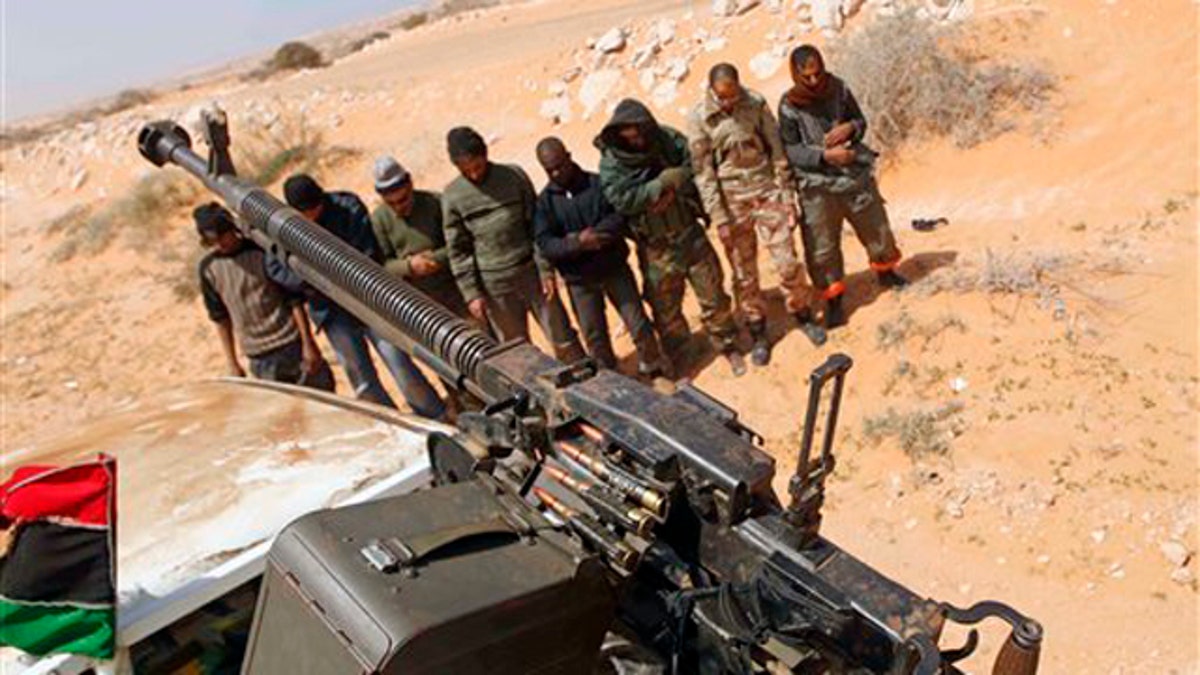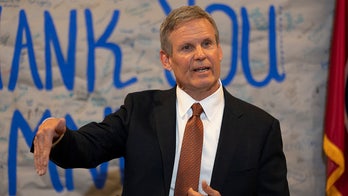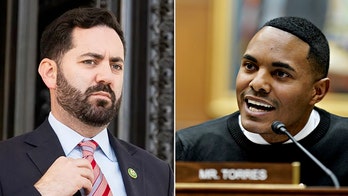
Libyan rebels pray 75 miles east of Sirte in eastern Libya March 28. (AP)
President Obama on Monday prepared to make his case to the nation about why he ordered U.S. forces to Libya in an address that gives him an opportunity to answer mounting questions about how long the conflict could last and under what conditions the United States would depart.
The president was facing criticism from lawmakers on both sides of the aisle ahead of the address. Sen. Bernie Sanders, D-Vt., expressed concern about the United States getting bogged down in a third war, urging Obama to "get out as soon as we possibly can." On the other end, Sen. Jon Kyl, R-Ariz., said in a statement that if Obama doesn't see to it that Muammar al-Qaddafi is removed, the world will see Obama "as an ineffectual leader and the United States as a weak country, one that is unwilling to live up to its rhetoric."
But administration officials staunchly defended the president's handling of the conflict and assured the public that questions will be answered. A senior administration official told Fox News the speech will effectively serve two purposes -- to outline the mission going forward and explain "how our efforts in Libya have advanced our interests and averted a catastrophe."
Deputy National Security Adviser Denis McDonough said later that an upcoming conference in London on Libya will also give allies an opportunity to work jointly on an end vision for the Arab nation.
"We do think it's very important to spell out an end state -- a vision of where this goes," he said in a briefing to reporters.
The Western alliance on Sunday agreed that NATO would take control of air operations, a mission that has been U.S.-led since last weekend.
That agreement will help bolster the administration's argument that U.S. involvement is limited, a point the president repeated when he was asked a question about war spending Monday morning during a town hall meeting at a high school in Washington, D.C. "Our involvement there is going to be limited, both in time and in scope," Obama said.
But the president still faces questions about how long U.S. forces could be committed to a conflict that, in the eyes of some policymakers, already qualifies as civil war.
Fighting intensified Monday in Libya after Western allies helped rebel forces reverse, or at least interrupt, Libyan leader Muammar al-Qaddafi's momentum. The ultimate outcome was still unclear. Rebels were moving toward Qaddafi's hometown of Sirte, but Qaddafi's forces claimed to have taken partial control of Misrata, a key rebel city.
Marc Thiessen, a former speechwriter for former President George W. Bush, said Obama needs to make clear whether the United States can tolerate the possibility of Qaddafi staying in power.
While Obama has said Qaddafi must go, he also insists the military campaign is not meant to achieve his ouster. Unclear, then, is whether Obama would be willing to withdraw U.S. forces while Qaddafi still reigns.
"People are very confused about why he's doing what he's doing," Thiessen told Fox News. "Can we consider this a success if Muammar Qaddafi remains in power? Why is it in our vital interest to remove Muammar Qaddafi from power? ... He has to give some coherence to this confusion and answer those questions."
Obama is bucking precedent in delivering an address about military action more than a week after that action was ordered. Other modern presidents have turned on the cameras and spoken to the public at the beginning of military involvement overseas. The president also will not be delivering his address from the Oval Office but will speak instead from the National Defense University in Washington, D.C.
McDonough said overall, the situation in Libya is unique and so the administration is stepping outside traditional decision-making rules.
"We don't make decisions about questions like intervention based on consistency or precedent. We make them based on how we can best advance our interests in the region," McDonough said. "We've been very clearly communicating why we're doing certain things in certain instances and not in others and we'll continue to do that."
The address will be aimed at Congress as much as the rest of the American public. Lawmakers from both sides of the aisle have assailed the president for not seeking their permission to go into Libya, with some going so far as to call his actions unconstitutional. The administration, though, insists it is on firm legal footing and has found both Republicans and Democrats who agree.
Rep. Duncan Hunter, R-Calif., wrote in an op-ed in the San Diego Union Tribune that the president's actions were "consistent" with his authority as commander-in-chief and with the War Powers Resolution of 1973. To have gone to Congress first, Hunter said, would have been to cede the "element of surprise."
"Open deliberation or any formal pronouncement to Libyan President Moammar Gadhafi would only have provided more time and opportunity to reposition personnel and tactical resources, such as artillery and anti-aircraft weapons," he wrote. "Now, due in large part to the advantage of superior air power, a line has been drawn between the rebels and Gadhafi's troops, while civilian populations are under far less threat of attack than before."
Hunter, like other lawmakers, stressed that the United States should not send in ground forces.
Secretary of State Hillary Clinton and Defense Secretary Robert Gates both defended the administration's actions over the course of several television interviews Sunday. Clinton emphasized that time was a factor in ordering the air strikes and said thousands could have been killed if the United States had not acted.
Gates, though, declined to predict how long the United States might be involved militarily.
So far, the United States has fired 186 Tomahawk missiles on Libya, according to a Pentagon spokesman. It also has flown 884 total sorties.




